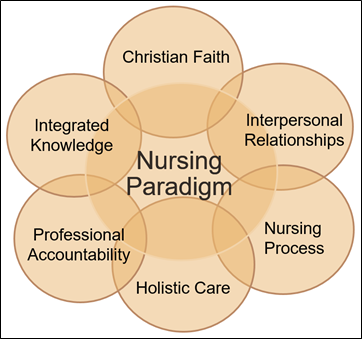2023-2024 Undergraduate Catalog [ARCHIVED CATALOG]
Department of Nursing
|
|
Faculty: H. Kibler (Director of BSN), S. Knauf (Director of MSN), H. Kreis, C. Stroup (Chair of Nursing, Chief Nurse Administrator), J. Swartz, L. Wyss
Professional Staff: M.J. Surace
Caring for persons with needs through professional competence and Christ-like compassion is the foundation of the baccalaureate nursing curriculum. This type of caring is possible as one is accountable to God, self, and persons with needs.
The BSN Program prepares a nurse generalist who is qualified to complete the National Council Licensure Exam (NCLEX-RN) once the program outcomes are fully met. The program allows the graduates to pursue specialized study in graduate programs leading to the MSN degree and to advanced practice certifications.
The Malone University Department Nursing baccalaureate degree program in nursing is accredited by the Commission on Collegiate Nursing Education (CCNE; http://ccneaccreditation.org), approved by the Ohio Board of Nursing, authorized by the Ohio Department of Higher Education, and holds memberships with the American Association of Colleges of Nursing (AACN) and the National Organization of Nurse Practitioner Faculties (NONPF).
Student Handbook
Philosophy
The Department of Nursing is an integral part of Malone University and aligns itself with the University mission statement, foundational principles, educational goals and community responsibilities. The programs and policies of Malone University are founded upon a commitment to the evangelical Christian faith, the Biblical principles of God’s love, and accountability to God for self and others.
It is this love and accountability to God and God’s call to care for the needs of all people that provide a natural foundation for the Malone nursing student to study and prepare to enter the profession of nursing in a diverse global society.
In line with many of the grand theorists of nursing, the philosophy of the nursing programs center on four foundational nursing concepts that include person, environment, health, and nursing. The faculty believe that situating the nursing paradigm within the conceptual framework of the nursing curriculum provides for the organization of content, skills, and expected professional behavior (Figure 1).

Figure 1. Department of Nursing Conceptual Framework
Nursing education is an interactive teaching-learning process within an interdisciplinary curriculum. Nursing scholarship serves to sustain and advance the knowledge and values of a profession dedicated to both social relevance and scientific advancement.
In addition to introducing students to the knowledge and values of the discipline, faculty and staff must also guide them to practice from a disciplinary perspective. Through the education experience, students become self-accountable and competent in seeing patients through the lens of wholeness and interconnectedness with family and community; appreciating how the social, political, and economic environment influences health; attending to what is most important to well-being; developing a caring-healing-relationship; and honoring personal dignity, choice and meaning.
Knowledge of the discipline continues to grow through graduate education, as students apply and generate nursing knowledge in their advanced nursing roles or develop and test theories as researchers. Nursing practice should be guided by a nursing perspective while functioning within an interdisciplinary arena. To appropriately educate the next generation of nurses, disciplinary knowledge must be leveled to reflect the competencies or roles expected at each level.
Through nursing education, scholarship, and practice, grounded in love and accountability to God and God’s call to care for the needs of all people, Malone nursing students are prepared to enter the profession of nursing in a diverse global society.
Works cited:
Shelly, J.A., Miller, A.B., & Fenstermacher, K.H. (2021). Called to care: A Christian vision for nursing. InterVarsity Press.
Program (Student) Outcomes
- Synthesize theoretical and empirical knowledge from the liberal arts, sciences, humanities, Christian faith, and nursing as a source for advancing nursing scholarship and making nursing practice decisions in a variety of nursing contexts and settings.
- Practice Christian values, ethics, and caring qualities in such a way that personal values are maintained while respecting the rights and dignity of persons with varying physiological, psychological, sociocultural, developmental, and spiritual needs resulting in a foundation for holistic care.
- Analyze and interpret health status and health potential using the nursing process to facilitate clinical decision-making for prioritization and evaluation of nursing care of patients (person, family, community, and populations).
- Practice professional accountability and responsibility to provide safe and effective care grounded in evidence-based practice to improve quality and patient outcomes.
- Utilize effective leadership skills to facilitate the management of patient care through delegation, professional communication, and collaboration with an interdisciplinary team.
ProgramsUndergraduate MajorCoursesNursing
|